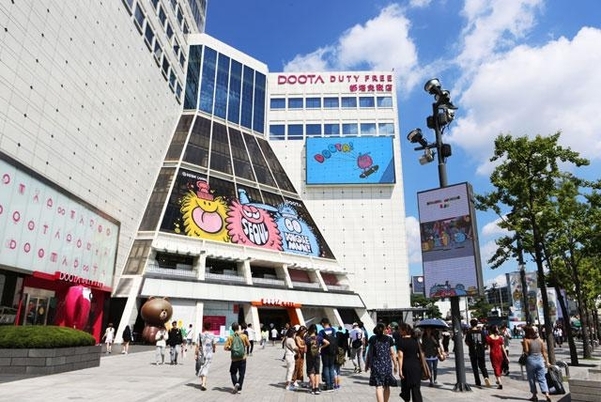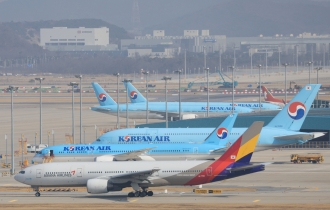Behind the demise of duty-free businesses
South Korea’s once-lucrative duty-free industry revealed poverty in the midst of plenty last week when Doosan said it was shutting down its duty-free stores, following in the footsteps of Hanwha Group.
The combined sales of all duty-free shops reached 2.24 trillion won ($1.93 billion) in September, a record high, but as it turned out many duty-free operators are in the red.
Doota Duty Free, a unit of Doosan, held a license valid through the end of 2020 but decided to give up early. The unit saw sales of 700 billion won the year it launched, but that figure fell to 405.8 billion won last year. In the past three years, it has accumulated a total of 60 billion won in net loss.

Doota Shopping mall
(Doosan)
Hanwha Galleria Timeworld withdrew from the duty-free business in April after recording some 100 billion won in loss in three years.
Smaller duty-free businesses are also suffering. Hyundai Department Store Duty Free, launched a year ago, also logged 43 billion won in loss in the first half of the year. SM Duty Free, backed by Hana Tour, scaled back from seven floors to two as sales fell 35 percent to 58.5 billion won in 2018 from the previous year.
Both Doosan and Hanwha won licenses in 2015 when the number of duty-free shops stood at only six. Since then, it has more than doubled to 13.
In 2015, the government awarded five duty-free business licenses on the expectation that an increasing number of foreign tourists, especially Chinese travelers, would provide myriad opportunities for Korean retailers.
But that hope was dashed by an unexpected turn of events: a travel ban by the Chinese government. Apparently in retaliation after Korea decided to deploy the US Terminal High Altitude Area Defense anti-missile system in March 2017, Beijing imposed a ban on group travel to Korea.
Even though the momentum of Chinese tourism might have faded, China’s “daigou,” merchants who purchase tax-free goods overseas and sell them in China, continue to grow in number and now account for 70 percent of all duty-free sales. A daigou can buy duty-free products at a huge discount and sell them on platforms such as WeChat and Weibo, so duty-free stores competed to offer better deals.
However, the fierce competition cut into profit margins as daigou kept as much as 20 percent of the total sales revenue, amounting to 1.3 trillion won a year.
“The amount of fees given to daigou has been growing in the past years, which weighed down on our operation,” a duty-free shop employee told The Investor.
The demise of Doosan and Hanwha’s duty-free businesses proved how difficult it is to survive the cutthroat competition in which three major players -- Lotte Duty Free, Shilla Duty Free and Shinsegae Duty Free -- dominate the market with an 80 percent combined share.
“Big companies, which have years of experience and connections with high-end brands, can survive this game of chicken, but it is difficult for smaller players,” the employee said.
Despite growing competition and losses, the Korean government plans to select additional duty-free operators in November, according to industry sources.
“Last year alone, there were 800,000 visitors who came to Korea to see BTS. Because the country is attracting more and more non-Chinese tourists and diverse visitors, duty-free businesses have great potential,” said Seo Yong-koo, a professor at Sookmyung Women’s University. “But smaller business operators are suffering. It is not necessarily good to increase supply.”
By Park Ga-young (gypark@heraldcorp.com)
EDITOR'S PICKS
- Seoul shares rattled by Israeli attack on Iran; Kospi dips to nearly 11-week low
- S-Oil donates W560m to support firefighters
- LG CNS teams up with Yonsei University to nurture AI specialists
- Polestar 4 to make Korean debut in June
- S. Korea pledges W23tr venture capital fund for green investment at G20 meeting
- Sungsimdang outperforms bakery giants to log sales over W100b
- France rejects opening Paris flight routes to T'way Air, deals blow to Korean Air merger
- SK hynix chief underscores chip cooperation between Korea, US















